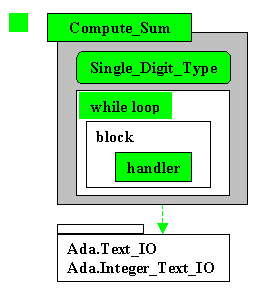[ Table of Contents ] [ Prev ] [ Chapter Overview ] [ Next ] [ Glossary/Index ]
An exception handler is a section
of code used to deal with some exceptional circumstance, such as the onset of an error
condition or the arrival of bad data. There are four things to learn regarding exceptions:
- How to declare a
(user-defined) exception
- How to raise a (user-defined)
exception
- How to handle a (language-defined or user-defined) exception
- How exceptions "propagate" when not handled in the region of occurrence.
The first two are illustrated on the next page. The third and fourth are covered below.
(In C++ an exception is "thrown and caught" whereas in Ada it is "raised
and handled.") An exception handler, if present, is always the final segment of the executable part of a program unit or
block. It follows the reserved word exception and precedes the final end
of the program unit or block.
General Form |
exception
when Exception_List_1 => -- first handler
handling_sequence_1;
when Exception_List_2 => -- second handler
handling_sequence_2;
-- etc
when others => -- last handler
handling_sequence_N;
end Unit_Name;
|
where an Exception_List has the form: |
Exception_Name_1 | Exception_Name_2 | ... |
Propagation of Exceptions
When an exception is raised (for example, when a numeric quantity goes out of range),
control jumps away from the normal executing sequence and an exception handler is sought
at the lowest possible level. That is, the runtime system first tries to find an
appropriate exception handler in the currently executing block or program unit and if one
is found, control goes there. If not, a handler is sought at the next higher level -- in
the unit that called the current unit. If an appropriate handler is not found following
"propagation of the exception up the
call chain" to the main procedure, the program fails. By "appropriate
handler" we mean one that contains the Exception_Name corresponding to the actual
exceptional event -- such as a predefined
exception or an exception declared and raised by the programmer (see example in
the next section).
Predefined Exceptions
There are four categories of language-defined
exceptions. If one of these occurs, the run-time system will automatically raise
the exception. They are:
- Constraint_Error - raised when a value goes out of the type's legal range.
- Program_Error - raised when control rules are broken, for example when running into the end
of a function before a return statement is encountered.
- Storage_Error - raised when an allocator
requests storage and not enough is available.
- Tasking_Error - raised when some improper task interaction occurs, such as when a called
task is completed before a queued entry call is accepted.
There are also exceptions declared in the predefined packages outlined in Appendix B.
Example Program with an Exception Handler

|
The program depicted here contains an exception handler inside a block,
which is inside a while loop. (A simple rectangle is used as the graphic symbol for each of these
constructs.) The handler responds to the situation where the user enters an inappropriate
input -- with more than one digit. Rather than have the program crash, the handler
notifies the user of the mistake, and the loop gives the user another opportunity to
provide a proper input. A proper input, in this case, is a single-digit integer, as
defined in the declaration of the subtype
Single_Digit_Type. |
Note that the handler illustrated here handles only one category of exception -- called
Constraint_Error. If another category (such as one that occurs when the user enters a
string of alphabetic characters) is raised, this particular handler would not suffice.
Source Code Listing
------------------------------------------------------------------
-- This program prompts the user to enter a sequence of single-
-- digit integers, and computes their sum. If a value larger than
-- nine is entered, an exception is raised and handled.
------------------------------------------------------------------
with Ada.Text_IO, Ada.Integer_Text_IO;
procedure Compute_Sum is
package Tio renames Ada.Text_IO;
package Iio renames Ada.Integer_Text_IO;
subtype Single_Digit_Int is Integer range 0..9;
Component : Single_Digit_Int;
Sum : Natural := 0;
Finished : Boolean := False;
begin
while not Finished loop -- start of loop
begin -- start of block
Tio.Put_Line("Enter 1-digit integer(zero to quit)");
Iio.Get(Component);
if Component = 0 then
Finished := True;
end if;
Sum := Sum + Component;
exception
when Constraint_Error => -- start of handler
Tio.Put_Line("Too many digits; try again");
-- end of handler
end; -- end of block
end loop; -- end of loop
Tio.Put("Sum = ");
Tio.Put(Integer'Image(Sum));
end Compute_Sum;
------------------------------------------------------------------
|
Here is a sample output from the above program:
Enter a 1-digit integer (zero to quit)
4
Enter a 1-digit integer (zero to quit)
8
Enter a 1-digit integer (zero to quit)
14
Too many digits; try again
6
Enter a 1-digit integer (zero to quit)
0
Sum = 18
|
Note that the block statement does not include a declarative part. This kind of block may
be referred to as a "begin-end block" or an "exception-handling
block."
Related Topics
[ Back to top of page ] [ Prev ] [ Next ]
